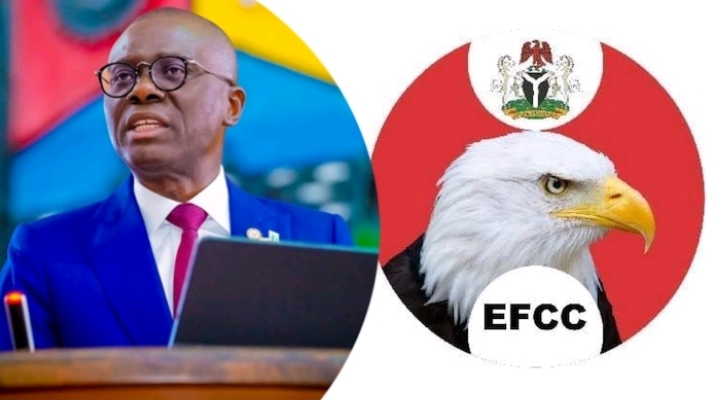Lagos Governor Sanwo-Olu Sues EFCC Over Alleged Plan To Arrest Him After Tenure Expiration
Sanwo-Olu is seeking protection against the EFCC’s alleged harassment.
AFederal High Court sitting in Abuja on Tuesday, adjourned the fundamental human rights suit filed by Governor Babajide Sanwo-Olu of Lagos State against the Economic and Financial Crimes Commission (EFCC) to November 11 for further mention.
In the suit filed through his lawyer, Darlington Ozurumba, Sanwo-Olu told the court that the anti-graft agency is threatening to arrest, detain, and prosecute him after his tenure, describing it as unconstitutional and a violation of his fundamental rights, the News Agency of Nigeria reports.
Sanwo-Olu is seeking protection against the EFCC’s alleged harassment. When the case was mentioned in court, Ozurumba announced that he had replaced the original summons with a new one, which had been served to the EFCC.
However, the EFCC’s counsel, Hadiza Afegbua, denied receiving the documents, and the proof of service wasn’t in the court file. As a result, Justice Joyce Abdulmalik adjourned the case until November 11 for further mention.
Sanwo-Olu’s suit alleges that EFCC’s actions are instigated by his political adversaries, based on false information. The outcome of this case will be crucial in determining the limits of the EFCC’s powers and the protection of governors’ rights in Nigeria.
In the originating summons, marked: FHC/ABJ/CS/773/2024, and filed on June 6, the governor raised seven questions and sought 11 reliefs.
Sanwo-Olu sought a declaration that under and by virtue of the provisions of Section 37 of the 1999 Constitution, “the plaintiff, as a citizen of Nigeria, is entitled to right to private and family life as a minimum guarantee encapsulated under the Constitution of the Republic of Nigeria, 1999 before, during and after occupation of public office created by the Constitution.”
He wants the court to declare that under and by virtue of the provisions of Sections 43 and 44(1) of the 1999 Constitution, he is entitled to acquire, own, operate and manage both moveable and immovable property.
This, he said, includes bank accounts, as a minimum guarantee encapsulated under the constitution either before, during and after leaving the public office of governor of a state.
He also wants the court to declare that upon community reading of the provisions of Sections 35(1) & (4) and 41(1) of the constitution, the threat of his investigation, arrest and detention by the EFCC during his tenure of office as governor is illegal.
He also said that the plan to arrest him was unconstitutional and a flagrant violation of his fundamental right to personal liberty and freedom of movement as guaranteed under Sections 35(1) & (4) and 41(1) of the Constitution of the federal Republic of Nigeria, 1999 ( as amended).
The governor prayed the court to declare that the incessant harassment, threat of arrest and detention, against him upon the EFCC’s instigation by his political adversaries based on false and politically motivated allegation of corruption is a misuse of executive powers and abuse of public office.
He further wants the court to declare it as an unwarranted interference with his fundamental right to personal liberty, freedom of movement, fair hearing and equal protection of the law as guaranteed by the constitution and the Africa Charter on Human & Peoples’ Rights, CAP A9 LFN 2004.
Mr Sanwo-Olu, therefore, sought an order restraining the EFCC from harassing, intimidating, arresting, detaining, interrogating or prosecuting him in connection with his tenure as the governor of Lagos State.
He also prayed the court to make an order prohibiting and restraining the commission “from seizing the property, passport and travel documents of the plaintiff or freezing the bank accounts of the plaintiff, his family members or in any other way to further breach the plaintiff’s fundamental rights guaranteed under the constitution.”
He urged the court to make an order restraining the EFCC from inviting, arresting or detaining him in connection with his tenure as governor of the state or breach his fundamental rights to personal liberty, fair hearing, private and family life, freedom of movement, acquisition of moveable and immoveable property as enshrined in the laws
In the affidavit in support of the originating summons deposed to by Martha Kanu, a litigation secretary in the law firm, the lawyer said she was informed of the facts by the governor at a tele-conference meeting which she believed to be true.
She alleged that as a way of getting at the governor, the EFCC was now making a surreptitious plan to arrest some of his aides and family members based on the false and spurious allegations of diversion of funds.
She said the officials of the commission were now mounting pressure on some of the aides of the governor to come and make incriminating statements against him.
Kanu alleged that the anti-graft agency was also threatening to go after some contractors handling projects for the state government.
He said the agency was compelling them to come and make statements to implicate Mr Sanwo-Olu of corruption as part of the orchestrated contrivance to build up a trump up case against him.
According to her, in a malicious attempt to get at the plaintiff, some of the plaintiff’s political adversaries in conjunction with some of the officials of the defendant are falsely ascribing to his administration corrupt practices which are nonexistent.
She alleged that the EFCC, through some of its officials, were desperately inventing false, spurious and malicious allegations against the governor to use as a basis for investigating, arresting and prosecuting him after leaving office as governor.
Mr Sanwo-Olu was sworn in as the governor of Lagos State on May 29, 2019 and was re-elected and sworn in again for a second term on May 29, 2023.



























